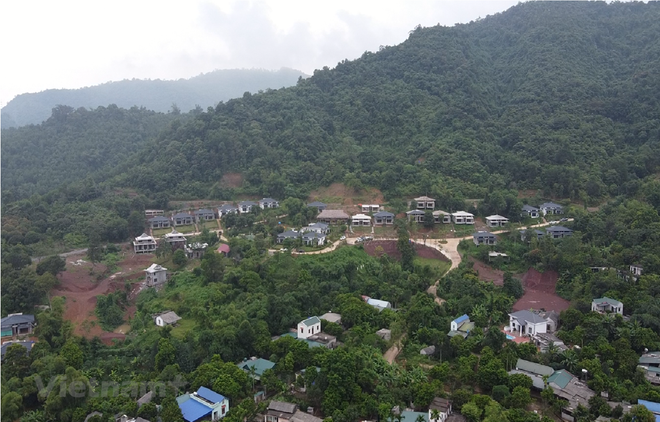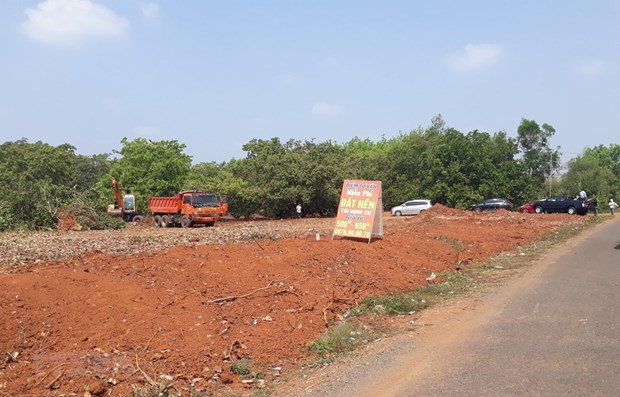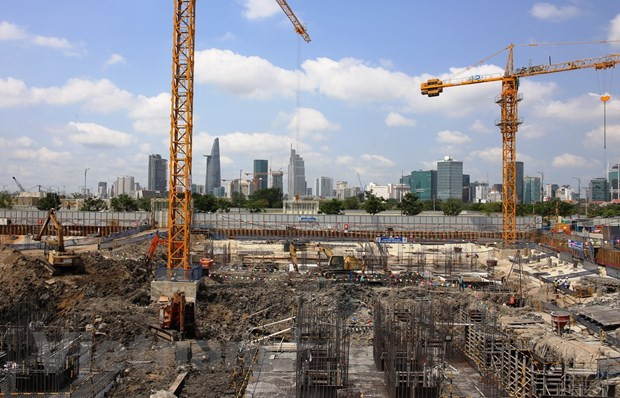Hanoi (VNA) – The real estate market in the first half of 2021 was like a “spring” that was pressed when COVID-19 resurged, and rebounded strongly once outbreaks were over, and the more it is pressed, the more strongly it will rebound, said a representative of Batdongsan.com.vn.
The COVID-19 resurgence in the second quarter has caused considerable adverse impacts on many provinces and cities nationwide. However, the property market still recorded encouraging signs in terms of investment, supply, and newly established firms, promising a rosy outlook for the market in the rest of the year.
“Land fever” moving to countryside areas
A representative of Batdongsan.com.vn, a member of PropertyGuru - a group owning Asia’s leading property tech platforms, said demand in the real estate market in April dropped by nearly 18 percent from the previous month.
Northern Hai Phong city topped the localities with the sharpest nosedive of 34 percent in attention compared to the pre-pandemic period, followed by the northern province of Bac Ninh (29 percent) and central Da Nang city (21 percent).
These were also the localities recording “land fever” and attention peak in Q1.
Even the property hotspots in the southern region during the first three months like Binh Duong, Dong Nai, Lam Dong, Long An, Ba Ria - Vung Tau also saw less attention in April.
The COVID-19 resurgence in May dealt another punch to the market.
Data from Batdongsan.com.vn showed that attention to real estate, especially land, continued to shrink strongly in May, especially Bac Giang (down 49 percent), Bac Ninh and Ha Nam (46 percent), Vinh Phuc (38 percent), Da Nang (36 percent), and Quang Nam (35 percent), which were also the ones reporting a large number of domestic COVID-19 cases then.
In contrast, encouraging signs have been spotted in the garden house, farm and resort property segments in outlying areas, a trend that surged when the pandemic first broke out.
This trend developed throughout last year but became stagnant in late 2020 and early 2021. As the fourth wave of COVID-19 infections began hitting the country in May, it has become hot again.
Land plots with beautiful views in the suburbs of Hanoi such as Ba Vi, Hoa Lac, Soc Son, Quoc Oai, Son Tay, and Xuan Mai are still attracting attention, leading to slight price increases of 2 - 7 percent compared to one - two months ago.
Money flow shifts from land to apartments
While other types of real estate, particularly land, witnessed less attention due to the pandemic, the demand for apartments, in all the high-end, mid-end, and affordable segments, went up in both Hanoi and Ho Chi Minh City in May.
Nguyen Quoc Anh, Deputy General Director of Batdongsan.com.vn, said the “land fever” in Q1 has cooled down since the latter half of April, and when the market encountered difficulties caused by the strong coronavirus resurgence from May, the money flow and attention have shifted to apartments.
He noted apartments have always received much attention as they meet the real demand of buyers and have stable growth in prices.
Over the recent years, apartment prices in Hanoi have risen by an average of 1 - 3 percent year on year, according to statistics of Batdongsan.com.vn.
Rosy signs for latter half of 2021
The representative of Batdongsan.com.vn held that the COVID-19 pandemic poses risks but also creates opportunities for the property market.
Hanoi and HCM City need about 140,000 housing units every year, but the small supply since 2019 has forced many businesses to change their strategies.
Notably, the market recorded a year-on-year surge of 60.4 percent in the number of new property firms set up in May, a sign believed to be positive for the market’s recovery this year.
Dinh Minh Tuan, Director for the southern region of Batdongsan.com.vn, said money is flowing into the securities market, and this is also a good point of time for property firms to get ready for an investment inflow into the market once the pandemic is brought under control.
In the long term, Vietnam’s real estate will always be a potential market as the urbanisation rate in the country is 35 percent, much lower than the 50 percent in Thailand and over 60 percent in China, not to mention the considerable demand from the population of nearly 100 million.
Besides, Tuan believed that real estate remains a safe haven that guarantees both safety and profitability in case of economic crises./.
































